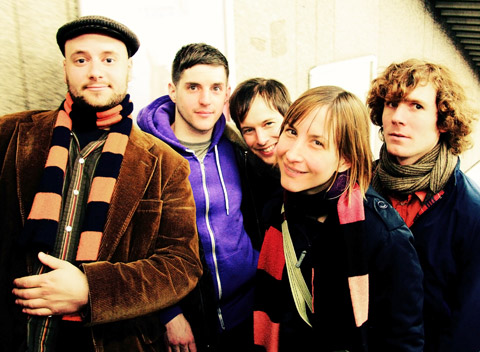
STEM LINE “Every time we put out a record I feel like we’re a new band again,” says Gary Olson. “We’ve always been under the radar for so long.” |
Brooklyn might not be the first place that comes to mind when thinking about overgrown blooms and country air. But for the past 16 years, Gary Olson of the Ladybug Transistor has made the city parks and street-lined canopies of Flatbush his own private garden. In some ways, the sweetly goofy trumpet player/guitarist is like the trumpeter swan in E.B White’s classic book — seeking haven not in the Boston Public Garden but in his nearby Prospect Park.
“When we were writing Albermarle Sound, the cover from that album — which looks very green — is actually just the park down the street from my house,” says Olson via phone from Flatbush where he has lived since childhood. “I think a lot of that record and maybe Argyle Heir were inspired by the park and this area. It’s a little more lush than what you might think Brooklyn would be.”
Yet for Ladybug’s latest, Clutching Stems (Merge Records), the longtime associates of the Elephant 6 Collective paint with a different shade of green. The line-up is different. The sounds are crisper and the arrangements more deliberate, leaving the ’60s behind for the first time and using rhythms (even drum machines!) that forge straight ahead toward ’80s pop. And though Olson’s distinctively deadpan baritone still works magic on those charming melodies (it’s no surprise that Belle & Sebastian’s Stuart Murdoch recently pegged the singer to record demo vocals for the ultra-dry God Help the Girl soundtrack), the metaphorical stems he is left clutching signify that some of these changes — such as the tragic passing of drummer San Fadyl — are unhappy, unanticipated ones.
The dreamy but bruised “Breaking Up on the Beat” is a classic happy/sad song, and one that transforms tears into smiles with an almost Phil Spector–like splendor. It’s also a break-up song so fun to sing that you almost forget that somebody got hurt along the way. Although any change is painful by necessity, maybe these cut flowers haven’t wilted just yet. “We knew we needed to do something different. But it wasn’t like jumping off a cliff,” says Olson of this recent Ladybug go-round. “Every time we put out a record I feel like we’re a new band again. We’ve always been under the radar for so long. And that’s kind of nice in a way. We’ve never had a big flash. It definitely has contributed to the longevity of the group.”
In the past, the band may have been perceived as being a little too quaint because of their defiant lack of acknowledgement of pop after 1970 (even Abbey Road was a bit late for them, and Who’s Next never happened). So perhaps the newest round of changes will finally give them a wider audience. Once a purist analog holdout, Olson has at least partially embraced the convenience of digital recording. (He produces not only Ladybug Transistor out of his home studio but also retro-minded bands such as the Beets and Crystal Stilts, whose keyboardist Kyle Forester shares duty with Ladybug.) He has also packed away the obscure ’60s sunshine and soft-pop records from which Ladybug cribbed most of their orchestral-pop sounds in favor of the pleasures of stumbling on new musical discoveries.